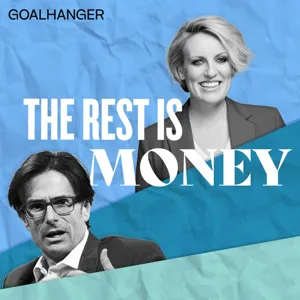52. When privatisation fails: Why is the water industry drowning in debt?

Explore "infrastructure investment" with insightful episodes like "52. When privatisation fails: Why is the water industry drowning in debt?", "The Baltimore bridge collapse", "Why Russia was caught off guard", "The Intelligence: Iran increases the stakes in the Middle East" and "The $6.5 Trillion Dollar Problem Nobody Notices" from podcasts like ""The Rest Is Money", "Today, Explained", "FT News Briefing", "Economist Podcasts" and "Economics Explained"" and more!



The UN Security Council passed a resolution demanding a ceasefire in Gaza, the Ukraine war distracted Russian security forces from addressing Islamist terrorism threats, and Boeing chief executive Dave Calhoun plans to step down at the end of the year. Plus, the FT’s Antoine Gara explains how infrastructure went from an investment backwater to a $1tn asset class.
Mentioned in this podcast:
How Ukraine war distracted Moscow from Isis-K threat
Infrastructure: from investment backwater to a $1tn asset class
Israel cancels Washington visit after UN resolution demands Gaza ceasefire
Boeing CEO Dave Calhoun to step down as company battles safety concerns
The FT News Briefing is produced by Fiona Symon, Sonja Hutson, Kasia Broussalian and Marc Filippino. Additional help by Kyra Assibey-Bonsu, Zach St. Louis, Sam Giovinco, Peter Barber, Michael Lello, David da Silva and Gavin Kallmann. Our engineer is Monica Lopez. Topher Forhecz is the FT’s executive producer. The FT’s global head of audio is Cheryl Brumley. The show’s theme song is by Metaphor Music.
Read a transcript of this episode on FT.com
Hosted on Acast. See acast.com/privacy for more information.

Iran-backed proxies have killed three American soldiers and injured dozens of others in their weekend strike. A response from the Pentagon seems inevitable, but what might it look like? If Britain wants to decarbonise, it is going to need to revamp the grid. The effort will be both pricey and political (10:54). And, making musicals into movies (18:12).
Sign up for a free trial of Economist Podcasts+. If you’re already a subscriber to The Economist, you’ll have full access to all our shows as part of your subscription. For more information about how to access Economist Podcasts+, please visit our FAQs page or watch our video explaining how to link your account.
Hosted on Acast. See acast.com/privacy for more information.


Steve Eisman is known for having bet against the housing market prior to the Great Financial Crisis in a trade immortalized by Michael Lewis in The Big Short. So what is he betting on now? In a special live episode of Odd Lots, recorded at the Bloomberg Invest summit, the Neuberger Berman portfolio manager discusses the recent banking turmoil (he thinks it's contained), the boom in anything related to AI, and his current bets on US manufacturing and infrastructure. He also talks about investing in rewiring the nation's electricity grid and why he thinks this theme has years left to play out.
See omnystudio.com/listener for privacy information.


Most of the big retailers have assured their customers that shelves will be stocked for the holidays this year. Nonetheless, there has been a lot of anxiety about shortages and supply chain disruptions all year. On this episode of Odd Lots, we speak with John Porcari, Port Envoy to the White House Supply Chain Disruptions Task Force. He's been coordinating the efforts to get the containers moving again. He explains what's been accomplished so far, and what more needs to be done.
See omnystudio.com/listener for privacy information.

With the $2 trillion American Jobs Plan, the economic theory that is Bidenomics is taking shape. It’s big. It puts climate at the center of everything. It is more worried about political risks — losing the House, giving Donald Trump a path back to power — than some traditional economic risks, like wasting money and bumping up inflation. It prefers to err on the side of spending more and making sure people know they got a bridge or a job than doing less and having people question whether government is working for them. But I still have a lot of questions about Bidenomics, in terms of both its economic theories and its political ones.
Brian Deese is the director of the National Economic Council, the nerve center that coordinates economic policy across the executive branch. He led the auto bailout in the Obama administration and then turned to climate, first in the Obama White House and then at BlackRock. When President Biden brought him on to run the N.E.C., it was a message: In the Biden administration, all economics was going to be climate economics.
I asked Deese to join me on the podcast to talk about how his economic policymaking and thinking have changed since 2009, what the Biden administration learned from the successes and failures of the Obama era, why so much of the White House’s economic policy is framed in terms of competition with China, why he doesn’t think a carbon tax is the right answer for climate, how the Biden administration will invest in the care economy and more.
You can find transcripts (posted midday) and more episodes of "The Ezra Klein Show" at nytimes.com/ezra-klein-podcast, and you can find Ezra on Twitter @ezraklein.
Thoughts? Guest suggestions? Email us at ezrakleinshow@nytimes.com.
“The Ezra Klein Show” is produced by Rogé Karma and Jeff Geld; fact-checking by Michelle Harris; original music by Isaac Jones; mixing by Jeff Geld.

Texas freezes as the power grid buckles; the Washington Post worries that conservatives are complaining too much about cancel culture; and Joe Biden loses it on national TV, but the fact checkers are there to save him.
Get your copy of "How to Destroy America in Three Easy Steps" here: https://utm.io/uHjV
Learn more about your ad choices. Visit podcastchoices.com/adchoices
Stay up to date
For any inquiries, please email us at hello@podcastworld.io